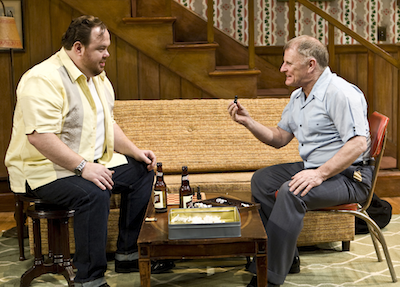1960s Midwest Drama Burns Slowly on Stage
An Early History of Fire
Theater Row
410 W. 42nd Street
New York, NY

An Early History of Fire is the coming of age story of a college dropout who lives with his dad, hangs out with two neighborhood fools and tries to win the love of a rich college girl who sees him as her hunky summer fling. The play by David Rabe, one of America’s finest playwrights, is set in 1962 and loaded with early sixties references, such as the music of Elvis Presley, the works of writer J.D. Salinger, Soviet space satellites and “the pill.” The college girl preaches that the 1960s will eradicate the dreadful decade of the ‘50s.
The problem with the play, though, is that it is a fire that burns slowly and goes out pretty quickly.
The first act fails to capitalize on the historical storms looming in the 1962 sky. (Didn’t anybody in the play hear of the Cuban missile crisis that fall?) The second act is like an entirely different play. There are battles between Danny and his friends, shoving matches between dad Emil and Danny, raucous parties, women in their underwear, drunken speeches, people jumping on chairs, roomfuls of lost souls and a lot of talk about beating up the "dorks" in town.
Rabe wrote The Basic Training of Pavlo Hummel, Sticks and Bones, Streamers and Hurlyburly. Here, he goes back to his childhood in the Midwest to write about what life was like far from the roar of the very political East Coast.
The tragedy about this family drama is that in 1962 so much was going on historically that Rabe could have merged events with his play to improve upon it. Here, college girl Karen tells Danny that she is a fanatic follower of writer J.D. Salinger and adores The Catcher in the Rye and Franny and Zooey. She gushes over the fact that every girl in her college curls up with the books every night. Karen, who drinks like a fish and smokes marijuana, tells everybody at a party that there might be a war in Indochina and someone else gives a nice speech about the beauty of Presley’s music. The people and the house have a ‘60s look to it. Throughout the play you sense that something is going to happen, but nothing does.
The play does not get very far and Rabe never really flushes out his characters. Danny, like so many others in that era, does not know what he wants to do with his life. He says that the only pure joy he ever felt was kicking extra points in high school football games. He has fun beating up kids with his friends on Sunday afternoons. He has no future and no real vision of one.
Karen can’t decide between intellectual college boys or salt-of-the-earth types like Danny. She has one boyfriend at school and has another at home in Danny. Boyfriend Danny’s friend Terry is aghast that his former girlfriend Shirley is a hooker on the other side of town. Father Emil seems lost as he searches for a job and a way to reconnect to his son. He is so conscious of his intelligence that when someone at a bar says he never graduated from high school he drives home to get his diploma to show the people at the bar. The ghost of Danny’s mother hovers over the living room and the old piano she used to play. It is a coming of age play that doesn’t come very far. There is no resolution in the lives of the people on stage beyond a rather predictable ending. You can sense that Rabe is trying to reach back in time to paint a portrait of the 1950s merging into the sixties. Karen brings that bridge up in one of her speeches). He doesn’t quite do it, though.
The director, Jo Bonney, wrestles with the cumbersome script. The actors do the best they can. The plays star Gordon Clapp as Emil, Theo Stockman as Danny, Claire van der Boom as Karen, Erin Drake as Shirley, Johnny Orsini as Terry, Devin Ratray as Benji and Dennis Staroselsky as Jake.
An Early History of Fire burns but the flame goes out too quickly. It is all smoke and no fire
PRODUCTION; Producers: The New Group. Sets: Neil Patel; Costumes: Theresa Squire; Lighting: Lap Chi Chu; Sound: Ken Travis. The play is directed by Jo Bonney.
